Abstract
Objective:
To present the recent research that underscores the value of preventing both dehydration and hyperthermia. Such efforts will improve the athlete's capacity to perform physical activity and reduce the risk of heat-related problems.
Data Sources:
Data were drawn from an extensive review of the scientific literature over the past 50 years with an emphasis on recent research (> 1990) that focuses on the physiological and performance benefits of fluid replacement.
Data Synthesis:
Even low levels of dehydration (eg, less than a 2% loss of body weight) impair cardiovascular and thermoregulatory response and reduce the capacity for exercise. Heat exposure also reduces the athlete's ability to train and compete, an effect that can be independent of hydration status. Even if athletes are well hydrated, hot weather alone will reduce their capacity to exercise. Optimal performance is possible only when dehydration and hyperthermia are minimized by ingesting ample volumes of fluid during exercise and by taking common-sense precautions in keeping cool. Recent research has demonstrated that consuming fluid in volumes approximating sweat loss maintains important physiological functions and significantly improves exercise performance, even during exercise lasting only 1 hour. Carbohydrate ingestion also improves exercise performance, an effect that is independent of, and additive to, preventing dehydration.
Conclusion/Application:
Athletes should follow an aggressive fluid replacement and temperature regulation regimen. Successful implementation of this regimen requires that athletic trainers, coaches, athletes, and support personnel are made aware of the benefits of adequate fluid replacement, that appropriate fluid replacement strategies are developed and implemented, that athletes have the opportunity to train themselves to ingest larger volumes of fluid more frequently, and that other practical steps are taken to keep athletes cool during both training and competition.
Keywords: dehydration, hyperthermia, exercise performance, heat illness, sports drinks
Full text
PDF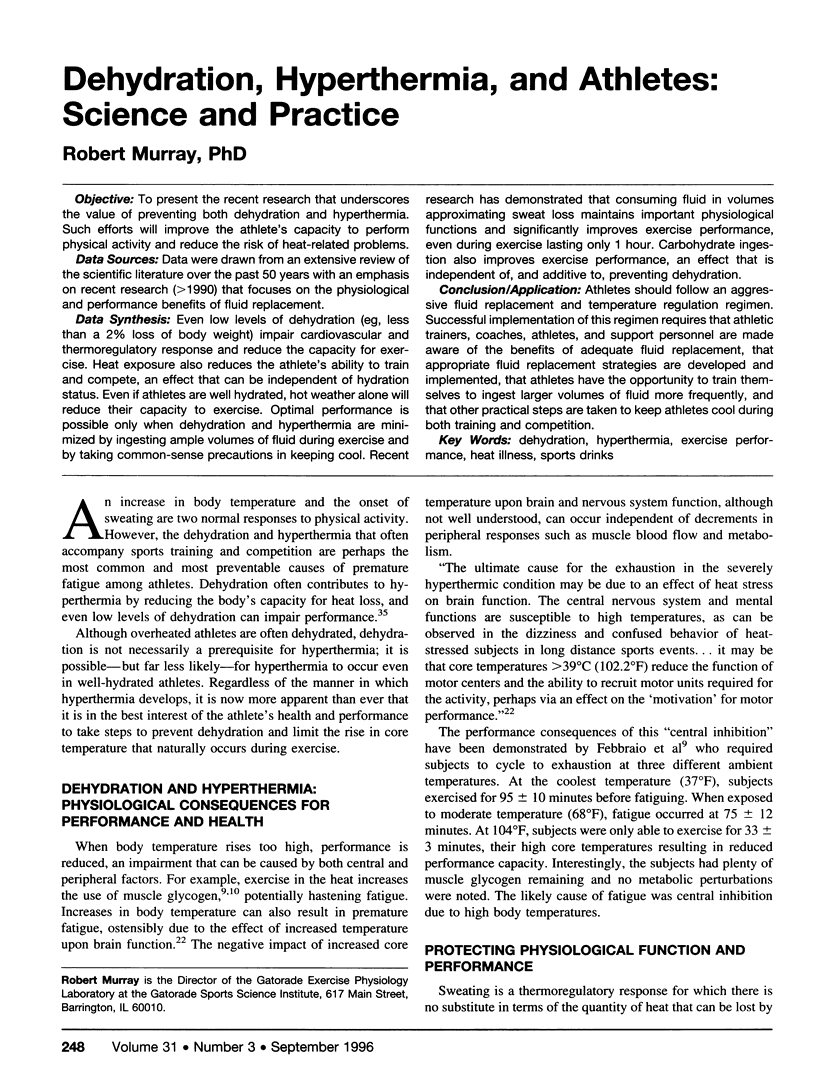
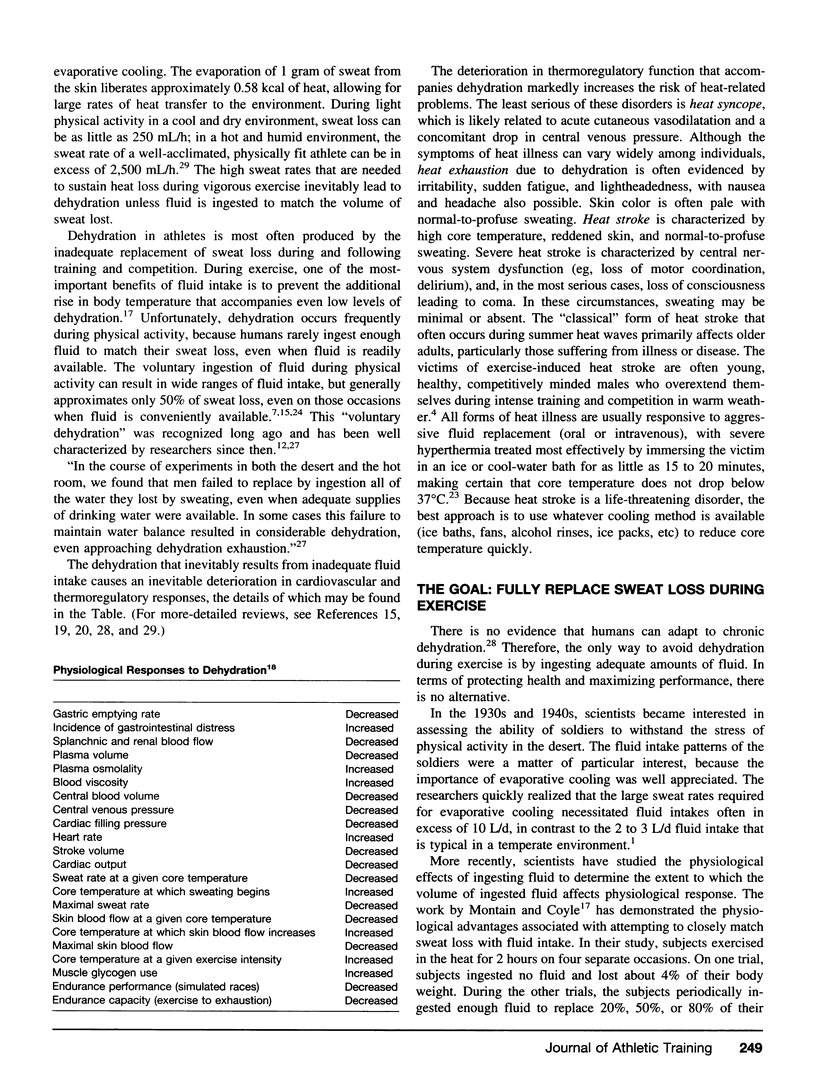
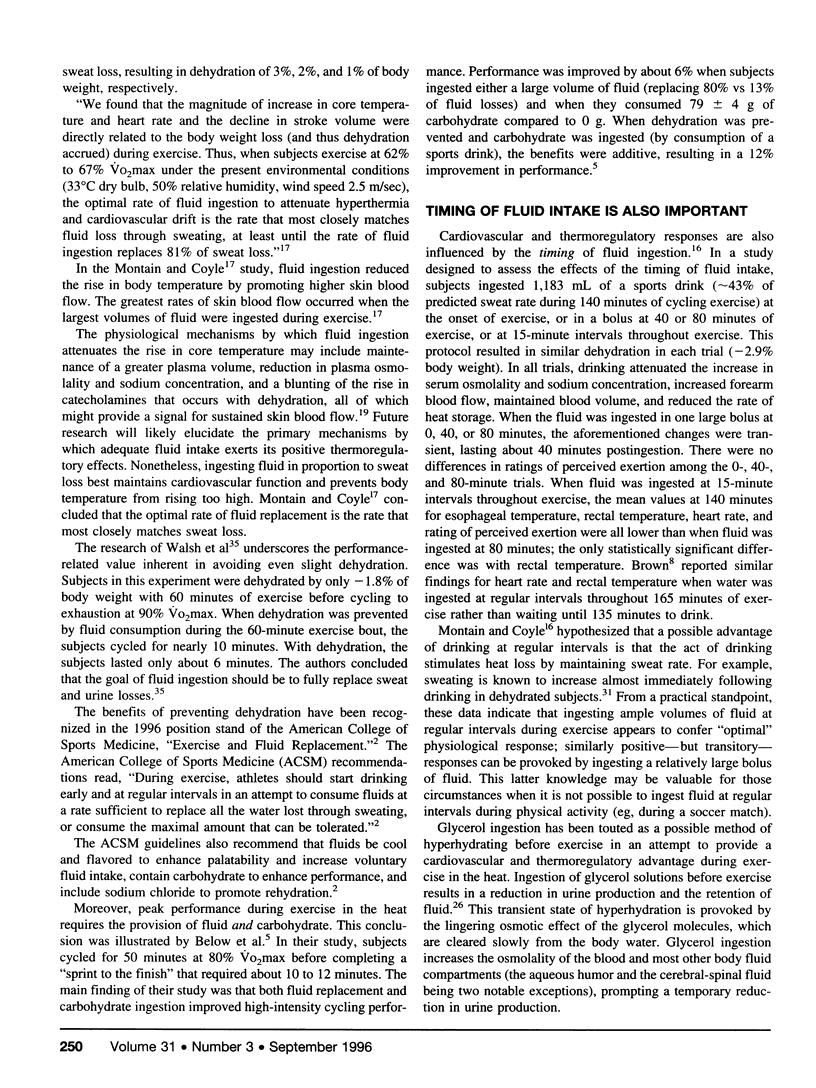
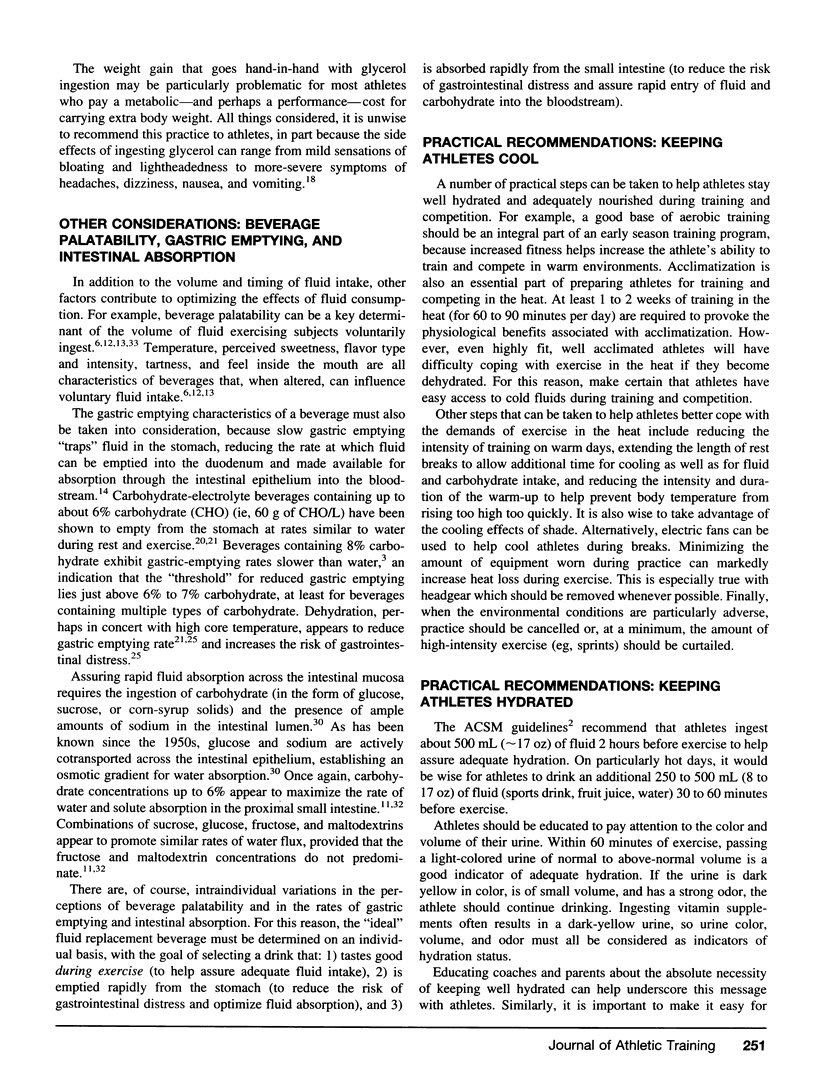
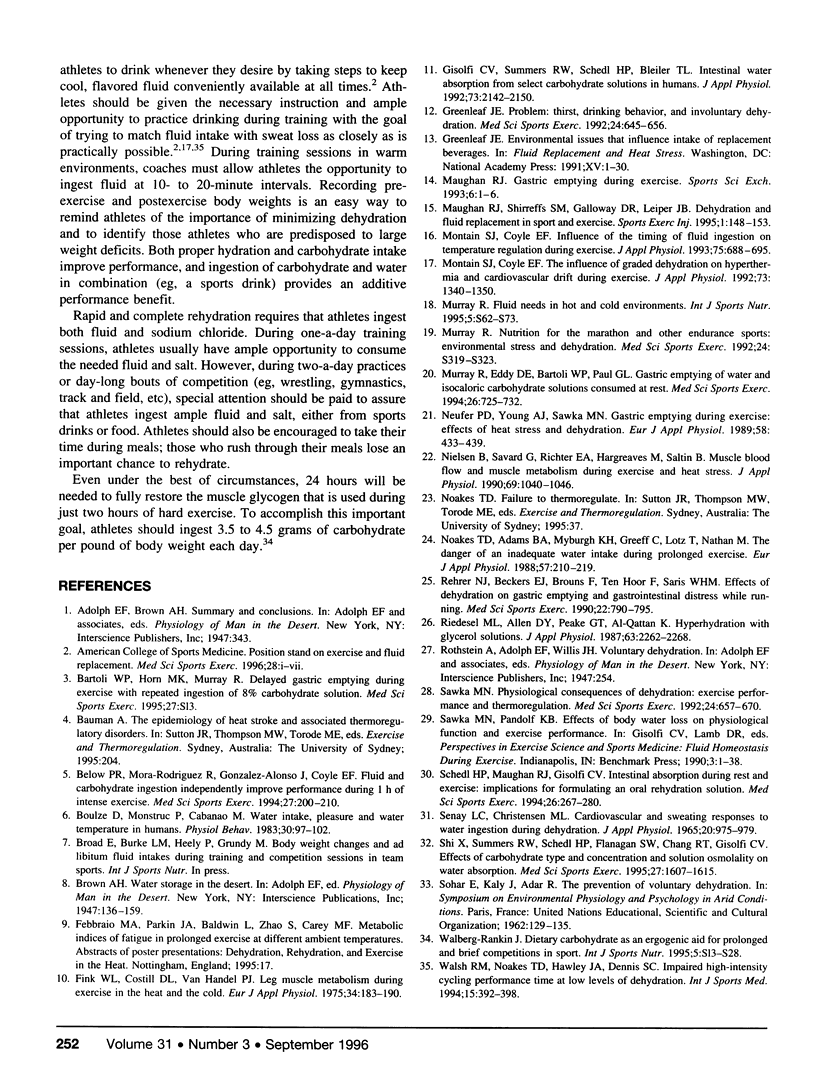
Selected References
These references are in PubMed. This may not be the complete list of references from this article.
- Below P. R., Mora-Rodríguez R., González-Alonso J., Coyle E. F. Fluid and carbohydrate ingestion independently improve performance during 1 h of intense exercise. Med Sci Sports Exerc. 1995 Feb;27(2):200–210. [PubMed] [Google Scholar]
- Boulze D., Montastruc P., Cabanac M. Water intake, pleasure and water temperature in humans. Physiol Behav. 1983 Jan;30(1):97–102. doi: 10.1016/0031-9384(83)90044-6. [DOI] [PubMed] [Google Scholar]
- Fink W. J., Costill D. L., Van Handel P. J. Leg muscle metabolism during exercise in the heat and cold. Eur J Appl Physiol Occup Physiol. 1975 Aug 15;34(3):183–190. doi: 10.1007/BF00999931. [DOI] [PubMed] [Google Scholar]
- Gisolfi C. V., Summers R. W., Schedl H. P., Bleiler T. L. Intestinal water absorption from select carbohydrate solutions in humans. J Appl Physiol (1985) 1992 Nov;73(5):2142–2150. doi: 10.1152/jappl.1992.73.5.2142. [DOI] [PubMed] [Google Scholar]
- Greenleaf J. E. Problem: thirst, drinking behavior, and involuntary dehydration. Med Sci Sports Exerc. 1992 Jun;24(6):645–656. [PubMed] [Google Scholar]
- Montain S. J., Coyle E. F. Influence of graded dehydration on hyperthermia and cardiovascular drift during exercise. J Appl Physiol (1985) 1992 Oct;73(4):1340–1350. doi: 10.1152/jappl.1992.73.4.1340. [DOI] [PubMed] [Google Scholar]
- Montain S. J., Coyle E. F. Influence of the timing of fluid ingestion on temperature regulation during exercise. J Appl Physiol (1985) 1993 Aug;75(2):688–695. doi: 10.1152/jappl.1993.75.2.688. [DOI] [PubMed] [Google Scholar]
- Murray R., Eddy D. E., Bartoli W. P., Paul G. L. Gastric emptying of water and isocaloric carbohydrate solutions consumed at rest. Med Sci Sports Exerc. 1994 Jun;26(6):725–732. doi: 10.1249/00005768-199406000-00012. [DOI] [PubMed] [Google Scholar]
- Murray R. Fluid needs in hot and cold environments. Int J Sport Nutr. 1995 Jun;5 (Suppl):S62–S73. doi: 10.1123/ijsn.5.s1.s62. [DOI] [PubMed] [Google Scholar]
- Murray R. Nutrition for the marathon and other endurance sports: environmental stress and dehydration. Med Sci Sports Exerc. 1992 Sep;24(9 Suppl):S319–S323. [PubMed] [Google Scholar]
- Neufer P. D., Young A. J., Sawka M. N. Gastric emptying during exercise: effects of heat stress and hypohydration. Eur J Appl Physiol Occup Physiol. 1989;58(4):433–439. doi: 10.1007/BF00643521. [DOI] [PubMed] [Google Scholar]
- Nielsen B., Savard G., Richter E. A., Hargreaves M., Saltin B. Muscle blood flow and muscle metabolism during exercise and heat stress. J Appl Physiol (1985) 1990 Sep;69(3):1040–1046. doi: 10.1152/jappl.1990.69.3.1040. [DOI] [PubMed] [Google Scholar]
- Noakes T. D., Adams B. A., Myburgh K. H., Greeff C., Lotz T., Nathan M. The danger of an inadequate water intake during prolonged exercise. A novel concept re-visited. Eur J Appl Physiol Occup Physiol. 1988;57(2):210–219. doi: 10.1007/BF00640665. [DOI] [PubMed] [Google Scholar]
- Rehrer N. J., Beckers E. J., Brouns F., ten Hoor F., Saris W. H. Effects of dehydration on gastric emptying and gastrointestinal distress while running. Med Sci Sports Exerc. 1990 Dec;22(6):790–795. doi: 10.1249/00005768-199012000-00010. [DOI] [PubMed] [Google Scholar]
- Riedesel M. L., Allen D. Y., Peake G. T., Al-Qattan K. Hyperhydration with glycerol solutions. J Appl Physiol (1985) 1987 Dec;63(6):2262–2268. doi: 10.1152/jappl.1987.63.6.2262. [DOI] [PubMed] [Google Scholar]
- Sawka M. N. Physiological consequences of hypohydration: exercise performance and thermoregulation. Med Sci Sports Exerc. 1992 Jun;24(6):657–670. [PubMed] [Google Scholar]
- Schedl H. P., Maughan R. J., Gisolfi C. V. Intestinal absorption during rest and exercise: implications for formulating an oral rehydration solution (ORS). Proceedings of a roundtable discussion. April 21-22, 1993. Med Sci Sports Exerc. 1994 Mar;26(3):267–280. [PubMed] [Google Scholar]
- Senay L. C., Jr, Christensen M. L. Cardiovascular and sweating responses to water ingestion during dehydration. J Appl Physiol. 1965 Sep;20(5):975–979. doi: 10.1152/jappl.1965.20.5.975. [DOI] [PubMed] [Google Scholar]
- Shi X., Summers R. W., Schedl H. P., Flanagan S. W., Chang R., Gisolfi C. V. Effects of carbohydrate type and concentration and solution osmolality on water absorption. Med Sci Sports Exerc. 1995 Dec;27(12):1607–1615. [PubMed] [Google Scholar]
- Walberg-Rankin J. Dietary carbohydrate as an ergogenic aid for prolonged and brief competitions in sport. Int J Sport Nutr. 1995 Jun;5 (Suppl):S13–S28. doi: 10.1123/ijsn.5.s1.s13. [DOI] [PubMed] [Google Scholar]
- Walsh R. M., Noakes T. D., Hawley J. A., Dennis S. C. Impaired high-intensity cycling performance time at low levels of dehydration. Int J Sports Med. 1994 Oct;15(7):392–398. doi: 10.1055/s-2007-1021076. [DOI] [PubMed] [Google Scholar]


